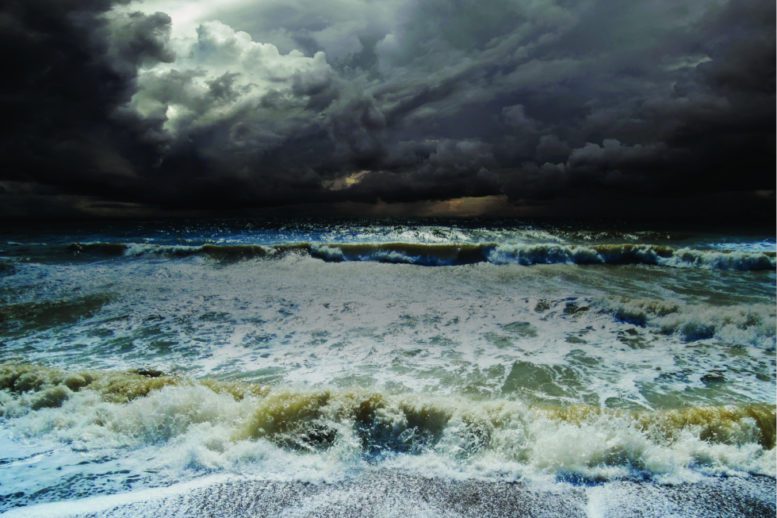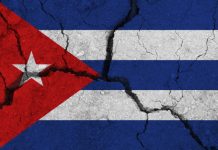
Lieutenant Steven Castell MA ’16 was just weeks into a new job when Hurricane Matthew brewed over the Atlantic Ocean. The new commanding officer for the City of Miami Police Department’s Office of Emergency Management and Homeland Security watched as the storm advanced north over the Caribbean, leaving a path of destruction in its wake and changing course on an hourly basis.
Floridians clambered to prepare for the impact of the fall 2016 storm, eyes glued to the news as it devastated Haiti and Cuba. Schools closed, and families living along the coast were encouraged to evacuate.
All the while, Castell and his team were preparing to implement a hurricane response-and-recovery plan.
Castell’s training in FIU’s Master of Disaster Management program, combined with 19 years’ experience on the force, made him perfect to lead the city’s emergency management team.
“When I was approached for this position, it’s because it had come to the attention of the captain that I was finishing up FIU’s program, and he had heard a lot of good things about it,” Castell said. “It really catapulted me into this position.”
As Matthew drew closer to the Florida coast, Castell advised the police chief — who made the ultimate decisions — on key strategic moves to ensure citizens’ safety and a smooth response-and-recovery period post-storm.
“It was quite the pressure cooker, but fortunately everything worked out very well,” Castell said. In the end, Matthew left Miami-Dade County relatively unscathed, but made landfall in northern Florida and destroyed much of the coast into North Carolina.
At FIU, disaster management students learn that preparing for the worst is an ongoing process, much of which occurs when there is no threat.
“This is a profession where you can make a difference in people’s lives, not just after a disaster, but often before — to better educate, train and prepare them, and strengthen the community so the impacts are so much less,” said Ruben D. Almaguer, FIU’s assistant vice president for disaster management & emergency operations and executive director for the Academy for International Disaster Preparedness.
 Ahead of the curve
Ahead of the curve
In the fall of 2015, FIU became the first university in the state to offer a dedicated master’s degree program in disaster management, joining a shortlist of universities nationwide that offer programs preparing professionals to handle large-scale emergencies, including the University of Chicago and Georgetown University.
Program directors sought advice from top employers in the field on the coursework and experience they would want to see on graduates’ resumes. The result was a 12-month-long professional program that trains students in planning, media relations, hazard analysis, public health, mitigation, response and recovery, critical decision-making and more. Classes take place on Saturday to accommodate students’ full-time work schedules.
The federal government’s slipshod response to Hurricane Katrina in 2005 highlighted the need to develop such programs.
“Katrina really sent a message to emergency managers. ‘What if this was my state? How would I have responded?’” said former Deputy Secretary of Homeland Security and Federal Emergency Management Agency administrator David Paulison, who spoke to the 2015 and 2016 cohorts about lessons learned following the New Orleans disaster. “After that, we saw a great interest in people preparing themselves for major events. It’s about preparing employees and preparing your system.”
The impact of disasters worldwide is growing. According to the United Nations Office for Disaster Risk Reduction, disasters have caused $1.4 trillion in damages worldwide since 2005, killing 700,000 and affecting 1.7 billion people.
At FIU, diverse student cohorts bring together police officers, firefighters, military, lawyers, doctors, nurses and others — many of whom have worked in their fields for years — to transform their professional experience to help people on a larger scale.
“Many of our students are in six-figure professions today working in great jobs,” Almaguer said. “They want a master’s degree because they want to be the next police chief, the next fire chief, the next CEO of Carnival Cruise Lines, the next surgeon general for the state of Florida.”
Throughout the semester, students hear from a variety of guest speakers, including Mike Marx, a senior civil-military coordination advisor for the United Nations Office for the Coordination of Humanitarian Affairs. And professors offer their firsthand insights into the field, preparing students with insider knowledge.
“The faculty do so much. They bring a sense of reality to the field,” said current class president Bridget Pelaez. “They’re visceral in the sense that they are not here to show you a superficial layer of anything. They are here to peel back the onion layer by layer. They even tell you personal mistakes and personal goals.”
The program emphasizes collaboration and networking among students — relationships that will prove useful in the field as organizations often must work together to respond to emergencies.
“I’m sitting in a room with a guy who used to disarm bombs, and to the right of me is a fire marshal and in front of me is a U.S. Marshal, so the conversations are bigger and more global than they would be at another table,” said Pelaez, who is a disaster response nurse. “It’s 100 percent inspiring.”
Pelaez, a member of the FIU-Florida Advanced Surgical Transport team, the university’s all-volunteer team of medical professionals trained to respond to disasters, came to FIU after working in disaster response for years. She has deployed to multiple national and international situations, including the 2010 earthquake in Haiti, during which she tended to rural victims at a clinic set up in an orphanage. Having taken on leadership roles throughout her career, a degree that would boost her management capabilities was a natural choice.
“I felt like I wanted to help more people around the world, and that if I tied myself to a corporation or a hospital, I wouldn’t be able to still fight and go after that global compassion I knew I wanted to achieve. Every time I was deployed to a disaster, that’s where I really felt like a nurse, and I really felt like I naturally just stepped up to operations level.”
Castell found his way to FIU after six years in the Army National Guard and nearly two decades on the force, where he led the bomb squad and supervised the intelligence and terrorism unit.
“I always wanted to transition my career into the realm of emergency management, and I felt this was in line with those career goals.”
China Walker MA ’16 chose FIU for its location.
“I was interested in South Florida because it’s [so] impacted by hurricanes. It’s a great community to learn about disaster management.”
An emphasis on experience
As an employer, Paulison looks for people who have both an educational foundation and solid experience in the workforce.
“We want someone who is a go-getter,” Paulison said. “It’s not an easy job. It’s a lot of work before a disaster and a significant amount after. You don’t get a lot of sleep. You need someone willing to work and who has a real interest in disaster management.”
Students at FIU are encouraged to pursue internships in the field before graduation to boost their resumes and give them a realistic idea of the job.
Walker interned in the planning section of the Miami-Dade County Office of Emergency Management. There, she had the opportunity to help with preparedness projects, emergency evacuation plans and public outreach.

“It gave me an insight into the incident command structure and helped with writing documents for response, which was one of the most important things I could learn. I saw how the final product presented to the public was formed,” said Walker, who now works in Washington, D.C., at an IT company that contracts with the federal government. “It was definitely an important experience and probably the reason I have the job I currently have.”
Pelaez also interned at the Miami-Dade County Office of Emergency Management. During her time there, she assisted in creating plans to contain communicable diseases on cruise ships and to more efficiently staff medical evacuation centers by potentially using FIU medical and nursing students as volunteers.
“That would give back to the community, and it would also allow FIU students to add emergency response to their resumes,” Pelaez said. “I look at it as, ‘How can I help my community, and how can I help people who want to help?’”
Student Pedro Duran Padovani currently interns at FIU’s Department of Emergency Management, where he helps devise emergency plans. A 26-year-old physician who earned a medical degree from Universidad Americana in Santo Domingo, he hopes to use his background in public health as an international humanitarian, perhaps working for the World Health Organization.
“In my internship, I’m taking what I learn in class and applying it to the real world,” he says. “When I started the program I thought it was going to be a lot of fieldwork, but no. The process of applying and implementing plans, learning what we can do with what we have and how to do it, is the most important part.”
A final that challenges students’ limits
In July 2016, the imperiled (and fictitious) country of Bockistan, situated in the Himalayas, was rocked by a magnitude 7.8 earthquake. Students were flown in by helicopter to assist first responders. For 48 hours, the cohort lived in tents on a makeshift base camp they set up themselves, eating military rations and fighting the heat and mosquitoes of Bockistan (staged at FIU’s Biscayne Bay Campus with the help of the U.S. Coast Guard and Miami-Dade Urban Search & Rescue Team and Air Rescue).
Their mission: Devise and implement a plan to coordinate governmental and non-governmental organizations’ aid to Bockistani people.
There’s no multiple choice involved in this final exam. The field simulation puts students’ knowledge of course content and decision-making skills to the test in an environment designed to mimic the physical and mental stresses of managing a real-life disaster.
“It puts you in the mindset of what to expect if you were to deploy to a rural or international location,” Walker said. “It was very realistic.”
It’s an enlightening experience that helps students — like Walker, who was new to the field when she enrolled in the program — determine where they ultimately want to end up in this line of work.
“I think the field exercise really put things into perspective. There’s tons of work done behind the scenes, and I realized that’s where I fit. It was a really good learning experience and drove my career goals.”
Adds former FEMA administrator Paulison: “I think this is an excellent program. This profession is about taking care of families, and I think they’re taking those lessons very seriously at FIU.” ♦
[youtube https://www.youtube.com/watch?v=GhUG3tGtzHA]




